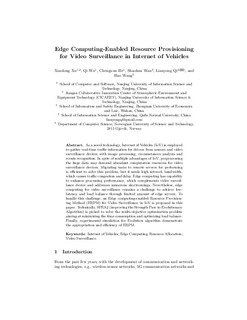Edge Computing-Enabled Resource Provisioning for Video Surveillance in Internet of Vehicles
Journal article, Peer reviewed
Accepted version

Åpne
Permanent lenke
http://hdl.handle.net/11250/2638794Utgivelsesdato
2019Metadata
Vis full innførselSamlinger
Originalversjon
Communications in Computer and Information Science. 2019, 1122 128-140. https://doi.org/10.1007/978-981-15-1301-5_11Sammendrag
As a novel technology, Internet of Vehicles (IoV) is employed to gather real-time traffic information for drivers from sensors and video surveillance devices with image processing, circumstances analysis and events recognition. In spite of multiple advantages of IoV, preprocessing the huge data may demand abundant computation resources for video surveillance devices. Migrating tasks to remote servers for performing is efficient to solve this problem, but it needs high network bandwidth, which causes traffic congestion and delay. Edge computing has capability to enhance processing performance, which complements video surveillance device and addresses numerous shortcomings. Nevertheless, edge computing for video surveillance remains a challenge to achieve low-latency and load balance through limited amount of edge servers. To handle this challenge, an Edge computing-enabled Resource Provisioning Method (ERPM) for Video Surveillance in IoV is proposed in this paper. Technically, SPEA2 (improving the Strength Pare to Evolutionary Algorithm) is picked to solve the multi-objective optimization problem aiming at minimizing the time consumption and optimizing load balance. Finally, experimental simulation for Evolution algorithm demonstrate the appropriation and efficiency of ERPM.